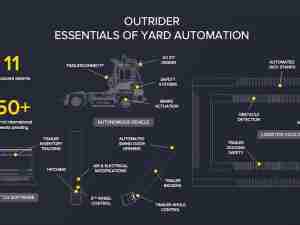Platon Electronic Toll Collection (ETC) System impact on logistics market
posted by AJOT | Jul 14 2017 at 08:50 AM | Intermodal
Vilnius - In accordance with the Resolution of the Government of the Russian Federation of January 31, 2017 No. 120, a new Plato system tariff was introduced on April 15, 2017. According to the system test period (2015 - 2017), the tariff was raised by 25%, although the increase was initially planned for 50% .
Platon Electronic Toll Collection (ETC) system was introduced in order to ensure compliance with the collection of toll charges, established by the current legislation, to offset damages caused to Russian federal highways by vehicles exceeding 12 tons gross vehicle weight. The main purpose of the system is to facilitate and process the collection of toll charges to offset damagse to the road paving. The money goes to the Federal Budget, which finances the road and transport infrastructure construction and maintenance. There are two ways to pay the ETC: by using a toll ticket or an on-board unit. The calculation is made based on the actual mileage of the vehicle.
According to data taken 15 June 2017, the PLATON ETC system had registered over 854,000 heavy goods vehics, delivered 650,857 on-board units, issued 12,900,000 toll tickets and collected 27,136,013,000 roubles in the Road Fund of Russia
According to the mass media, the introduction of the Platon ETC system forced unprepared players to leave the market).Mostly these are small companies. This resulted in a decrease in the number of vehicles and, accordingly, an increase in services rates.
During the two years the sytem was in service, the turnover of all transport decreased by 10%
The extremely competitive market of transport and logistics requires all players to reduce freight forwarding costs. Nevertheless, the tariffs of freight forwarding companies continue to grow. The increase in tariff is due to many factors: depreciation of the rouble, tightening of the tax control over the freight forwarding business, drivers' labour regime (driving period and rest period), and introduction of Platon ETC system. Platon's toll charges are not great in comparison to other costs. But the introduction of an additional fee is perceived painfully and, of course, will lead to a further rise in prices for freight forwarding services.
Small businesses suffer the most. There is much tension around the issue of investing funds, which is required by Platon ETC system. The equipment itself is expensive, most of the vehicles are purchased on credit or by leasing, about 85% of Russia's transport is acquired by means of leasing: The project of granting discounts for small businesses is already being considered by the Government.
"The situation is is made worse by the presence of sketchy schemes on the market, due to which the freight forwarding services are actually underpriced. It is difficult for many freight forwarding companies to make profit in the conditions of such competition. Platon ETC system identifies not only those who do not want to pay for the system, but also those who do not want to pay taxes. Customers are already accustomed to artificially lowered prices and it should take a long time before the situation stabilizes. But even if Platon ETC system is cancelled altogether, will it solve all the problems of the freight forwarding industry? Unlikely.” - Natalia Kuzovkina, Commercial Directory, ABIPA








